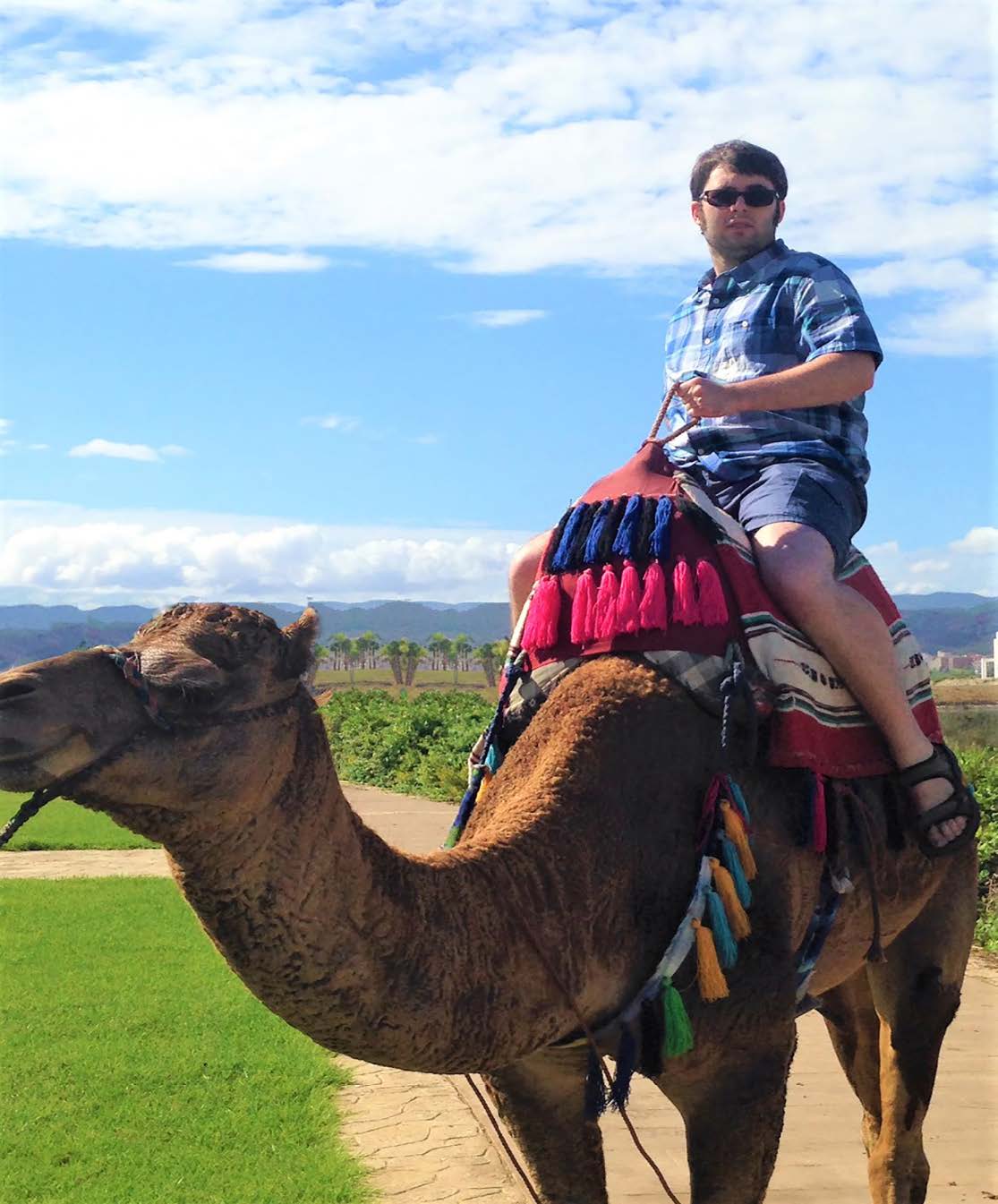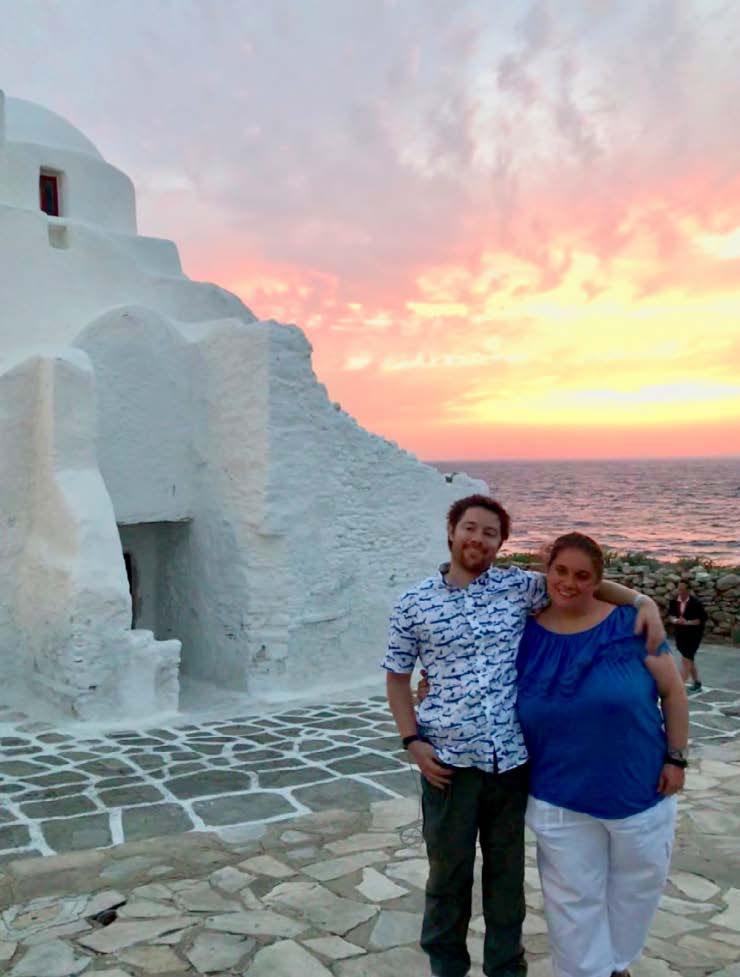BY CARA GORHAM STREIT, EDD, MSW, LCSW

Accessible and inclusive international trips are becoming widely available through middle and high schools, colleges, non-profits, and for-profit travel agencies, and the benefits of these experiences are deep and long-lasting.
"What are your plans for the summer?" How many times are we asked that question at the end of a school year? Any one of us would be thrilled to be able to answer "Oh, I'm going on a cruise around the Greek islands," or "I'm spending a couple weeks in Germany and the Swiss Alps." More than ever before, adolescents and adults with diverse disabilities have opportunities to engage in these exciting conversations.
Accessible and inclusive international trips are becoming widely available through middle and high schools, colleges, non-profits, and for-profit travel agencies, and the benefits of these experiences are deep and long-lasting.
Whether you are a self-advocate, a parent of a child or adult with a disability, or a professional, read on to find out how inclusive travel changes lives. As your tour guide may say while you're gallivanting through Paris or Madrid, allons-y, vamos, or let's go!
WHY TRAVEL?
- "All journeys have secret destinations of which the traveler is unaware." – Martin Buber
- • Learning about other cultures, people, landscapes, food, types of art, and ways of being in the world expands our perspective and helps us to understand that we are one small part of a much larger world. This understanding builds awareness, tolerance, acceptance, and empathy for others.
- • Travel challenges us by taking us out of our comfort zones and giving us new experiences we never could have anticipated. It teaches us flexibility and increases our tolerance for change and uncertainty in a way that feels exciting and adventurous, even when it's also a little scary!
- • When we travel, we get chances to practice our skills for independence in a setting that is highly motivating. Don't want to miss the guided tour of the Colosseum? Gotta get out of bed and get down to the lobby ready to go!
- • Inclusive travel opportunities are often group-based, and social engagement is an inherent part of the experience. Generally, group leaders for inclusive tours will intentionally and skillfully facilitate connections between travelers. Staffed small group outings, buddy systems, roommate pairings, and rows of seating on coach buses, planes, and trains create natural opportunities for travelers to have shared experiences, an excellent foundation for new friendships.
- • Not only does traveling with a group promote the development of new connections on tour, it also helps us connect with others when we get back home. Having an adventure gives us something interesting to talk about with other people! This is especially powerful for travelers who may face barriers to developing strong social connections or making small talk. Stories about adaptive zip lining in Costa Rica, buying spices in a market in Morocco, or that time your group leader didn't get off the Tube in London before the doors closed and she ended up at Piccadilly Circus – these are topics that almost anyone will find interesting in conversation. P.S… Did that last part happen to this author? She'll never tell! • Finally, you won't really know why you should travel until you do it! There are plenty of reasons to book a trip, but you can't appreciate the real impact of travel until you've tried it. Your fondest memories will be of things nobody told you would happen. My favorite example of this happened in 2018 on a trip to Greece. Because of significant flight delays, our group was re-booked on one of the nicest airlines in the world, and three members of our group were upgraded to first class for free. On a 12-hour flight! Upon sitting down in their fully reclining, semiprivate luxury cabins, they were offered pajamas and a pair of slippers. They sure couldn't have predicted that, but they'll never forget it!

AMAZING VIEWS: (Opposite page) Patrick experiences exotic Tetouan, Morocco; (Below) Tourists marvel at the Colosseum in Rome; Italy
Not convinced yet? These seasoned travelers are happy to tell you what they love about exploring the world:
"I feel like I'm living an adventurous life when I travel!" - Leslie, age 40 "I travel because I love to learn about the cultures of other countries. I feel independent and enjoy meeting new people. Traveling in a group makes me feel safe and secure." Brandon, age 28 "The reason I love traveling is because it is a wonderful experience for new adventures and seeking new experiences." - Olivia, age 27 "The reason why I love to travel and loved traveling to Greece is that I love meeting new friends and eating new food and experiencing the culture!" - Chelsea, age 33

EXPANDING HORIZONS: Travelers Hunter and Jessie explore the sites in Mykonos, Greece; Understanding that we are one small part of a much larger world builds awareness, tolerance, acceptance, and empathy for others.
HOW DO I FIND A GROUP TO TRAVEL WITH?
For school-aged students and college students with disabilities, school-sponsored trips can be an excellent option. Typically highly organized, structured, and supervised, these trips offer all or most-expenses paid options, usually have travel insurance, minimize the dreaded "free time," and generally have extensive emergency preparedness plans. As a bonus, they are often led by teachers or other school staff who are accustomed to working with students from a wide range of backgrounds and experi ences. Scholarships and structured fundraising opportunities may be built into these trips, making them more affordable than traveling on your own.
Adults can find travel opportunities through for and not-for profit organizations that specialize in inclusive travel. In the case of non-profits, subsidized spots may be available for travelers with financial need. Many travelers with disabilities can also travel through agencies and organizations that design individual and group travel experiences for all adults, with or without disabilities.
For more information on accessible and inclusive travel, try internet search terms like "travel agencies for people with disabil ities," "accessible tourism," "international travel and autism," and related terms that fit your interests and background. Bon voyage, and enjoy your next adventure! •
Whether travelers are self-advocating for their needs, or have a caretaker or staff person advocating with/for What should I consider, and how do I prepare? them, it's important to consider the ways in which life abroad, even for short stretches, will be different than life at home. Planning ahead for these differences will minimize their impact and maximize the traveler's enjoyment!
•Physical accessibility: Every country has its own unique laws about physical accessibility to public transportation, monuments, landmarks, hotels, restaurants, etc. It's important to do research and make your needs known in advance. When traveling with a group, make sure the group leader or travel coordinator understands any accessibility features you need. Make sure to think about airplane, bus, boat, public transportation, and other methods of transit that could be involved, as well as overnight accommodations and major tourist sites.
• Food sensitivities and allergies: It's not always easy to get allergy-sensitive meals in other countries, especially if you don't speak the language. If you have a serious allergy or sensitivity, in addition to the usual precautions you would take at home, make sure to carry a note card with you that explains your allergy in English and in the local language of the place you are going so you can show it to food service workers. Have an EpiPen with you, if you use one, and make sure fellow travelers, especially group leaders, are aware of your allergy.
•Other health conditions: Just like with allergies, it's important that group leaders are aware if you have a medical condition that could need treatment while abroad. Talk to your doctors about upcoming travel plans to find out if there are any additional vaccines or other precautions needed, and if you take prescription medications, consult with your provider on how to adjust the time you take them for any time change you'll experience. Bring extra medications with you, and carry your meds in your carry-on luggage if possible, to avoid them getting lost in transit. Bring a wallet card that explains your medical conditions and lists your medications and dosages in English and in the national language of your destination. For ease at airport security, bring the original prescription bottles, even if you also have your medications counted out in day-of-the week containers.
•Changes in routine: The excitement of traveling is as much about the experiences you never could have predicted as about the ones you've carefully planned out. If that thought gives you some anxiety, fear not. Yes, routines are an important part of life for many people, with and without disabilities, and there is no question that traveling disrupts those routines rather dramatically. Some of the anxiety this could cause can be managed by taking time to preview the idea that disruption is going to happen. For example: "The schedule for the day will be different than it is at home." "The food is going to be different than what you usually have." "It will be hotter there than it is here." Knowing some of the changes in advance, even without being able to predict exactly what the experience will be like, helps make the changes feel more manageable. At the same time, some things can stay consistent and give the traveler some grounding, so go over the things that will stay the same. "You'll still take your medications at the same time." "You'll still have your headphones and your music with you when you need them."
• Money: For many people, money management is a challenge, and when you're using a different currency than the one you're used to, it gets even more complicated. Downloading a currency exchange app on your phone/tablet that works both on and offline can help you understand what you're spending. Need to know what this 2,50 soda costs from euros to US dollars? Pop it in the app and find out (and yes, the comma in 2,50 is correct; that's another interesting difference you'll learn about when you travel!). Make sure to put a travel flag on your account for any debit or credit card you will bring so your banks don't think your card was stolen and shut it off. This can be done over the phone using the customer service number on the back of the card, and sometimes online. Finally, buy a little bit of the currency you need from your bank at home before you leave.
• Packing: Consult with the leader of the group on what to pack and how to pack it. They should have suggestions and will know the luggage allowances given the modes of transportation involved in your tour. Pack light, but do bring things that make you comfortable or would be difficult to get abroad. Toiletries and personal hygiene products may be very different in other countries, so bring the items you like with you from home. I also prefer bringing enough clothing so that I don't have to wash anything while traveling and I can spend my time enjoying the sites. Your preference may be different, and your group leader will know if it will be possible to do laundry while on tour. Understanding your daily itinerary and the weather will help you to pack appropriately. Make sure to leave room in your suitcase to bring back souvenirs!
•Get excited: Most important of all, think about where you want to go and what you want to see! International travel is a big commitment of time and resources, so make sure you're headed for a destination you're really excited about and with a group/organization that you think you will vibe well with. Learn about the place you're going so you can understand and appreciate what you see.
ABOUT THE AUTHOR:
Cara Gorham Streit, EdD, MSW, LCSW is the Associate Director and Director of Academics, Innovation & Inclusion of the Lesley University Threshold Program in Cambridge, MA, a comprehensive, college-based postsecondary program for young adults with a range of intellectual, learning, and developmental disabilities. Dr. Streit has organized and led international and domestic trips with Threshold Program alumni and EF College Study Tours to a number of destinations including Greece, Spain, Italy, France, England, and Germany.